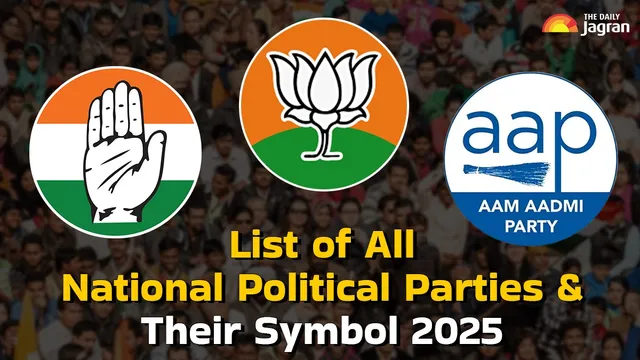- By Sarju Saran Tiwari
- Wed, 30 Jul 2025 04:56 PM (IST)
- Source:JND
Indian National Parties:The Election Commission of India (ECI) registers political parties and grants them recognition as national or state parties based on their performance in elections.This authority is derived from Article 324 of the Constitution of India, which provides the ECI with the power of superintendence, direction, and control of elections to Parliament, state legislatures, and the offices of President and Vice-President.
While the Constitution does not explicitly mention the registration of political parties, this power is interpreted to be included within Article 324.The detailed procedure for registration is governed by Section 29A of the Representation of the People Act, 1951, and recognition criteria are specified under the Election Symbols (Reservation and Allotment) Order, 1968.
India presently has six national political parties recognised by the Election Commission of India (ECI): Bharatiya Janata Party (BJP), Indian National Congress (INC), Communist Party of India (Marxist) (CPI‑M), Bahujan Samaj Party (BSP), National People’s Party (NPP) and Aam Aadmi Party (AAP).
These parties enjoy reserved election symbols nationwide, broadcast privileges, priority consultation on electoral rules, and star campaigner status.
What Is a National Party?
1. A national party is a political party with a presence across multiple states, unlike regional parties which operate primarily within one or two states.
2. These parties contest elections at the national level and generally aim to influence or form government at the Union level, beyond regional aspirations.
3. Recognition as a national party is not just symbolic; it ensures equal access to election symbols, airtime on media, and priority in allocation of party offices.
4. Despite their nationwide recognition, not all national parties hold significant political power or influence in every state or across central government decisions.
5. National parties are considered important for promoting pan-India political cohesion, reflecting broader national interests rather than sectional or state-specific concerns.
Criteria for Recognition As a National Party (As per ECI Guidelines)
1. A party must be officially recognised in at least four states by the Election Commission of India to qualify as a national party.
2. If in any recent Lok Sabha or state assembly election, a party secures 6% of valid votes in four states and wins at least 4 Lok Sabha seats, it qualifies.
3. Alternatively, if a party wins at least 2% of total Lok Sabha seats from not less than three different states, it gains national status.
4. The recognition of a party is reviewed periodically based on its electoral performance in general elections, and status may be upgraded or revoked.
5. Being a national party provides access to reserved symbols across India, which helps in building a consistent party identity across states.



